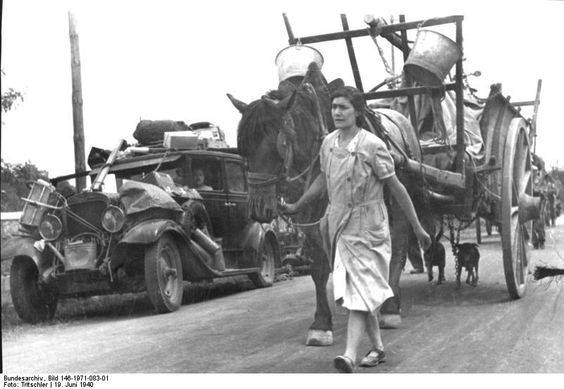Wednesday 19 June 1940
 |
| German women, children, and soldiers show their enthusiasm for the lightning victory over France. 19 June 1940 (AP Photo). |
General Rommel's 7th Panzer Division, in the occupation of the port area of Cherbourg, shell the citadel that is still occupied by the French. Resistance is pointless, so the local townspeople prevail upon the French soldiers to surrender at 17:00.
Pursuant to British Prime Minister Winston Churchill's agreement with General Sikorski, the Royal Navy takes off 4,000 Polish troops stranded at La Pallice. Almost all British troops already are evacuated pursuant to Operation Ariel. General Sikorski makes a broadcast telling Polish troops to get to England.
At Brest, the evacuation ends. The French destroy the port facilities. The demolition party escapes just before the arrival of the German 5th Panzer Division. The last Allies depart on the destroyer HMS Broke.
At St. Nazaire, seven empty transport ships wait for a reportedly large Polish group of refugees. About 2,000 men ultimately appear and are taken off. BEF commander Sir Alan Brooke has been taken off from here and arrives in England.
At Bordeaux and nearby ports on the Garonne River, the Hunt-class destroyer HMS Berkeley (Lieutenant-Commander H. G. Walters) evacuates the remaining British consular staff. The President of Poland and his cabinet also depart.
Polish ships Batory, Sobieski and the Ettrick and Arandora Star take on board everybody looking to escape from Bordeaux and remain through the night.
Responding to Germany's demand, the French government appoints plenipotentiaries to receive Hitler's terms. General Huntziger leads the delegation.
 |
| This Pz Kpfw 35 (t) of 6 Panzer Division was destroyed on 19 June 1940 in Épinal, France by a 25 mm anti-tank gun of the 46e GRDI. |
The Luftwaffe raids England again during the night.
The RAF raids German airfields near Amiens and Rouen with about 30 bombers and sends 112 bombers against industrial targets in the Ruhr.
Battle of the Atlantic: It is a big day for the U-boat fleet. It accounts for 40,000 tons in the Atlantic alone.
U-28 (Kapitänleutnant Günter Kuhnke) torpedoes and sinks 3,443 ton Greek freighter Adamandios Georgandis southwest of Ireland.
U-32 sinks Yugoslavian ship Labud.
U-48 (Korvettenkapitän Hans Rudolf Rösing) torpedoes and sinks 3,164-ton British freighter Baron Loudoun northwest of Cape Ortegal, Spain. There are 30 survivors and 3 crew perish.
U-48 also torpedoes and sinks 6,607-ton Norwegian freighter Tudor northwest of Cape Finisterre. There are 38 survivors, one crewman perishes.
U-48 also torpedoes and sinks British freighter Monarch.
U-52 (Kapitänleutnant Otto Salman) torpedoes and sinks 824-ton British freighter The Monarch in the Bay of Biscay. All 12 aboard perish.
U-52 also torpedoes and sinks 7,463-ton Belgian freighter Ville de Namur. There are 54 survivors and 25 perish.
U-25 (Kapitänleutnant Heinz Beduhn) torpedoes and damages 7,638-ton French tanker Brumaire in the eastern Atlantic. The Brumaire survives the day but is in bad shape.
Kriegsmarine S-boots (fast torpedo boats) sink British freighter Roseburn in the English Channel.
Convoy OA 171G departs from Southend, Convoy 171 departs from Liverpool.
North Africa: The Regia Aeronautica bombs Bizerta, Tunisia. It also bombs Calvi and Bonifacio in Corsica. They target British vehicles, while French aircraft bomb Italian airfields.
Royal Navy submarine HMS Orpheus is sunk by Italian destroyer Turtine off Tobruk.
A Royal Navy anti-submarine trawler, HMS Moonstone, working in conjunction with the British destroyer HMS Kandahar, captures Italian submarine Galilei in the Red Sea. The Galilei is towed to Aden and renamed the HMS X 2.
Lithuania: A demonstration occurs in Vilnius in support of the new Soviet occupiers.
Canada: The Canadian National Unity Party, a fascist organization, has been broken up and 11 of its members are brought to trial.
China: The Japanese government, taking advantage of France's difficulties, demands an end to the transit of war materials through French Indochina (later Vietnam).
British Homefront: The government has resumed its efforts to evacuate schoolchildren. It establishes the Children’s Overseas Reception Board to send them to safer cities overseas.
The BBC cancels its regular music program to broadcast war news. Reviews for PM Churchill's "Their Finest Hour" speech of 18 June are good.
American Homefront: Dale Messick publishes her first "Brenda Starr" comic strip in the Chicago Tribune.
Braves outfielder Paul Waner hits a single for his 3,000th hit, the seventh man in history to achieve the feat and the first since 1925.
 |
| French refugees on a road near Gien, France on 19 Jun 1940. (Tritschler, German Federal Archive: Bild 146-1971-083-01). |
June 1940
June 1, 1940: Devastation at Dunkirk
June 2, 1940: Hitler Visits France
June 3, 1940: Operation Paula
June 4, 1940: We Shall Fight
June 5, 1940: Fall Rot
June 6, 1940: Weygand Line Crumbling
June 7, 1940: British Evacuating Narvik
June 8, 1940: Operation Juno
June 9, 1940: Norway Capitulates
June 10, 1940: Mussolini Throws Down
June 11, 1940: Paris an Open City
June 12, 1940: Rommel at St. Valery
June 13, 1940: France Goes Alone
June 14, 1940: Paris Falls
June 15, 1940: Soviets Scoop Up Lithuania
June 16, 1940: Enter Pétain
June 17, 1940: The Lancastria Sinks
June 18, 1940: A Day of Leaders
June 19, 1940: U-boats Run Wild
June 20, 1940: Pétain Wilts
June 21, 1940: Hitler's Happiest Day
June 22, 1940: France Is Done
June 23, 1940: Hitler in Paris
June 24, 1940: Six Million Jews
June 25, 1940: German Celebrations
June 26, 1940: USSR Being Belligerent
June 27, 1940: Malta in Peril
June 28, 1940: Channel Islands Bombed
June 29, 1940: Gandhi Insists on Independence
June 30, 1940: Channel Islands Occupied
2020
No comments:
Post a Comment